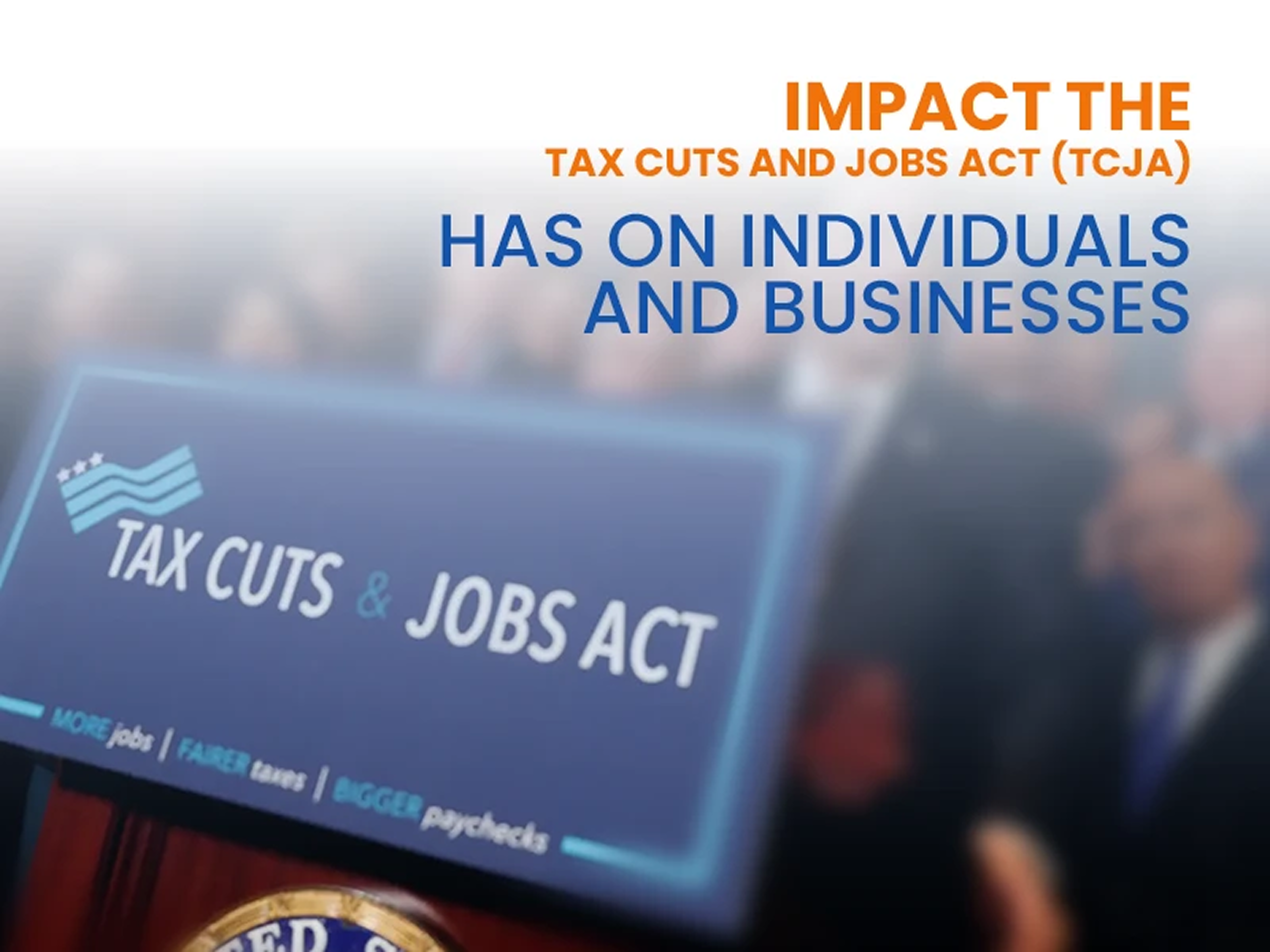
The Tax Cuts and Jobs Act (TCJA), which took effect on 1 January 2018, involved a major overhaul of the existing taxation code. It aimed to reduce tax rates for individuals, corporations, and households, apart from simplifying tax records maintenance and paperwork. Both personal and corporate income tax rates and bases underwent drastic changes, the ramifications of which will be felt in 2025 when certain exemptions under the act expire. To better understand the impact the Tax Cuts and Jobs Act (TCJA) is likely to have on your personal and business taxes, let's delve into a few of the Act's major provisions.
Some of the most talked facts about provisions of this Act include:
- Reducing the maximum corporate income tax and creating a single flat rate for corporate taxes
- Temporary drop in individual income tax rates
- Deduction for pass-through income
- Restructuring of international tax rules
- Removing the mandate on adequate health insurance
- Abolishing of corporate alternative minimum tax
- Increase in the standard deduction
- Estate tax exemption
- Individual alternative minimum tax exemption
Notably, many of the benefits to individuals under this Act will expire in 2025
Let's examine how the provisions of TCJA impact individuals and businesses.
Impact of TCJA on Individuals
1. Fall in personal tax rates
One of the major provisions of the TCJA was a reduction in the personal tax rates. While keeping the seven tax brackets of the previous act intact, tax brackets that were previously 39.6%, 33%, 28%, 25%, and 15%, were reduced to 37%, 32%, 24%, 22%, and 12%. The TCJA did not make changes to the lowest bracket rate of 10%. It also retained the 35% bracket without rate changes. These are temporary tax cuts and will expire in 2025.
2. Higher standard deduction permitted
The TCJA increased the standard deduction permitted to single filers and married couples. In 2024, single filers could deduct $14,600, while married couples who file joint returns could deduct $29,200. For tax filings in 2025, single filers will be permitted a deduction of $15,000 and married couples filing joint returns will be permitted a deduction of $30,000.
3. Mandatory health coverage removed
The mandatory health coverage requirement under the Affordable Care Act has been removed. This means that individuals who do not have health insurance coverage will not be penalized under the TCJA.
4. Creation of individual retirement accounts
The TCJA aimed to improve the retirement prospects of all Americans with the Setting Every Community Up for Retirement Enhancement (SECURE) Act which permits the creation of individual retirement accounts for senior citizens over 73 years old.
5. Increase in child tax credit
Under the TCJA, the child tax credit was increased and a non-refundable credit was created for non-child dependents. The changes will expire in 2025.
6. Exemption for estate tax
The Act has provided a temporary estate tax exemption which will end in 2025. Single filers can claim a maximum exemption of $13.6 million in 2024 and $13.99 million in 2025.
7. Student debt allowance
The TCJA permits the funding of K to 12 private school tuition by 529 plans up to an amount of $10,000 per annum per child.
8. Temporary suspension of personal exemption
The personal exemption amounting to $4,150 permitted under the previous tax regime has been suspended by the TCJA until 2025.
9. Increase in Alternative Minimum Tax
The TCJA has temporarily raised the exemption and exemption phase-out threshold under the Alternative Minimum Tax (AMT) applicable to individuals earning income above a certain level. The AMT stipulated that a tax filer was required to pay the government a minimum percentage of taxes, without taking into consideration any applicable tax deductions or credits. The AMT also allowed a certain amount to be treated as an exemption.
10. Limit on mortgage interest
The mortgage interest deduction permitted to married couples filing jointly has been temporarily limited to $750,000 worth of debt under TCJA until the end of 2025.
Impact of TCJA on Businesses
1. Corporate tax rates cut down
TCJA cut down corporate taxes from 35% to 21% in a bid to stimulate economic growth in the private sector. This is a permanent cut unlike the one for individuals. Corporate AMT was also repealed.
2. Increased deduction for short-term capital investments
Short-term capital investments no longer need to be depreciated over time but can be considered as immediate expenses under Sec 179 of the TCJA.
3. Deduction for pass-through businesses
Pass-through businesses such as sole proprietorships, S-corporations, and partnerships can now avail of a 20% deduction on pass-through income, subject to certain capping.
4. Cap on the deduction applicable to interest income
The TCJA caps the net interest deduction at 30% of earnings before considering interest and taxes.
5. Alteration to accounting mode
Under the old tax laws, businesses with $5 million or less in average annual gross receipts during the previous three years could adopt the cash mode of accounting. Under the TCJA, this law has been extended to cover businesses with 3-year average annual gross receipts up to $25 million.
6. Alteration to the law on net operating loss
Net operating loss carrybacks are no longer permitted under the TCJA, while carryforwards are capped at 90% of taxable income.
7. Abolition of Sec 199 deduction
The Sec 199 deduction for businesses engaged in production work and other domestic manufacturing activities, has been scrapped under the TCJA.
8. The territorial tax is introduced
The TCJA ushered in the territorial tax system which levied taxes on business income earned domestically. The Base Erosion Anti-abuse Tax (BEAT) was promulgated to counteract base erosion and profit shifting. Companies whose yearly gross receipts cross $500 million fall under the purview of BEAT.
9. Altered mode of handling intangible property
The TCJA changed how a company's overseas intangible property, such as patents, copyrights, and trademarks, was treated for taxation purposes and brought in the Global Intangible Low-taxed Income (GILTI) rules.
The TCJA resulted in a major overhaul of the existing federal tax codes. However, many of the changes brought in are likely to expire at the end of 2025. Whether the provisions of the TCJA will be extended, altered, or permitted to lapse depends on what lawmakers decide after 2025. Hence, you can expect significant changes in the US tax code beginning in 2026.
Finlotax: A professional tax consultancy firm in CA
We are Finlotax, your dependable taxation firm in CA. We can assist you in effectively dealing with all your TCJA compliance issues. If you need help with your firm's taxation or bookkeeping, take advantage of our competitively priced CFO, bookkeeping, tax prep, tax planning, payroll, and compliance solutions. For further details, you can contact us at 4088229406.

